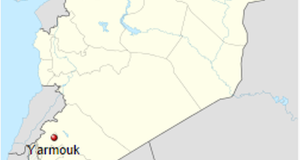“If I ever want to dig here again, under Palestinian, uh, protection, I’m going to have to… interpret these findings in a way that supports, rather than undermines, the ancient Palestinian claim.”
Jerusalem, May 2 – Archaeologists discovered a trove of first-century coins south of this city last week, including a series commemorating the Roman victory over a multi-year revolt in they year 70 CE, with the inscriptions on the coins raising troubling questions about the ancient identity of Palestine: all of the coins refer to the land by its Jewish name, with the term “Palestine” nowhere in evidence – despite the frequent modern adducing of “Palestine” coinage minted by the British Mandate to prove that a country by that named preexisted the modern state of Israel thoroughly undermine any Jewish claim to the land.
Lead archaeologist Professor Anna Kroniszt of the University of Antwerp led a team of students and Palestinian volunteers in the dig, which uncovered layers of settlement in territory under control of the Palestinian Authority under agreements with Israel. Kroniszt noted the disturbing implications of a Jewish coin that appears to predate the common use of the country’s obviously true and ancient name, Palestine, when numismatic evidence proving that Palestine came before Israel has become a staple of Palestinian advocacy. If the modern phenomenon constitutes valid proof of a country named Palestine before there was an Israel, the logic goes, then a much older coin celebrating the capture of “Judea” must perforce demonstrate the presence of a Jewish entity and the absence of any place called, or calling itself, “Palestine.”
“It’s a bizarre thing, and if it’s a genuine thing, we’re going to have to either cover it up or make a lot of people uncomfortable,” she acknowledged. “I know if I ever want to dig here again, under Palestinian, uh, protection, I’m going to have to find a way to interpret these findings in a way that supports, rather than undermines, the ancient Palestinian claim. It’s gong to pose a challenge, at least if I have any sense of intellectual honesty.”
Scattered ancient sources do refer to the place now called Israel as “Palestina,” notably fifth-century-BCE Greek writer Herodotus, but those references invariably come from writers naming the land from the outside, and not using the nomenclature of the people who lived there. In the specific case of Herodotus, a minority of scholars have argued that, following the general ancient Greek practice of translating, rather than transliterating, the names of the countries they discuss, his use of “Palestina” may well use the Greek word for “wrestler” and therefore represents a reference to the name “Israel,” which means “wrestles with God.”
Even the majority opinion among scholars, which holds that “Palestine” refers to the Philistine people who populated much of ancient Israel’s coastal region, poses a problem for the Palestine-is-ancient contention, in that those people never referred to themselves by such a term, and the term in fact comes from the Hebrew for “invaders,” an unfortunate flaw in the Palestinians-are-the-ancient-indigenous-people position.
Please support our work through Patreon.
Buy In The Biblical Sense: https://www.amazon.com/dp/B0B92QYWSL




